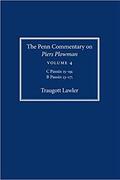
“Of all the poems of the English Middle Ages, Piers Plowman is the one that most deserves and needs annotation of the fullest and best possible kind, both because it is a text of unrivaled literary quality and interest, and because it is characteristically knotty and deploys a language of unusual richness, density, and allusiveness. Much of this allusiveness is to areas of learning that are not at every modern reader’s fingertips. A particular difficulty is the existence of the poem in three authorial versions of almost desperate complexity. It will be an immense triumph to have a commentary which elucidates their relationships as a matter of policy and not simply as the result of conflating annotation on the different versions.”—Derek Pearsall
The detailed and wide-ranging Penn Commentary places the allegorical dream-vision of Piers Plowman within the literary, historical, social, and intellectual contexts of late medieval England, and within the long history of critical interpretation of the poem, assessing past scholarship while offering original materials and insights throughout. The authors’ line-by-line, section by section, and passus by passus commentary on all three versions of the poem and on the stages of its multiple revisions reveals new aspects of the poem’s meaning while assessing and summarizing a complex and often divisive scholarly tradition. The volumes offer an up-to-date, original, and open-ended guide to a poem whose engagement in its social world is unrivaled in English literature, and whose literary, religious, and intellectual accomplishments are uniquely powerful.
The Penn Commentary is designed to be equally useful to readers of the A, B, or C texts of the poem. It is geared to readers eager to have detailed experience of Piers Plowman and other medieval literature, possessing some basic knowledge of Middle English language and literature, and interested in pondering further the particularly difficult relationships to both that this poem possesses. Others, with interest in poetry of all periods, will find the extended and detailed commentary useful precisely because it does not seek to avoid the poem’s challenges but seeks instead to provoke thought about its intricacy and poetic achievements.
Volume 4, by Traugott Lawler—covering passūs C.15-19 and B.13-17, the A version having ended earlier—creates a complete vade mecum for readers, identifying and translating all Latin quotations, uncovering allusions, providing full cross-reference to other parts of the poem, drawing in relevant scholarship, and unraveling difficult passages. Like the other commentaries, this volume contains an extensive overview and analysis of each passus, and the subdivisions within, large and small, and discusses all differences between the two versions. It pays careful attention to the poem at the literal level as well as to Latin texts that are analogues or even possible sources of Langland’s thought and it emphasizes the comedy of the poem, of which these passūs offer a number of examples.